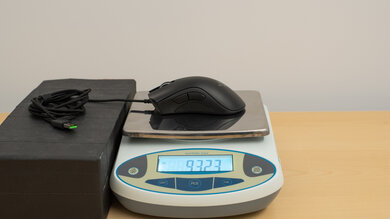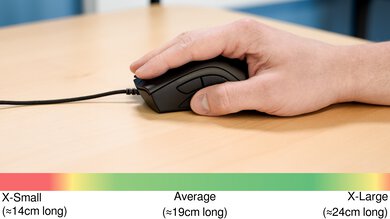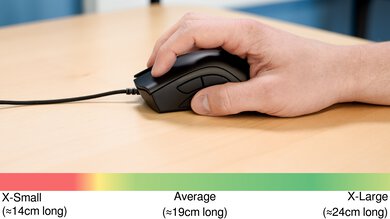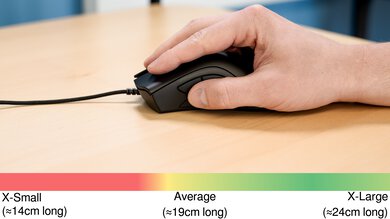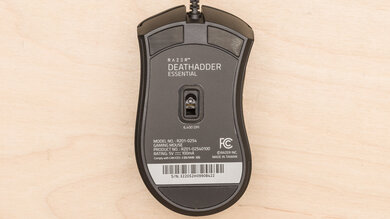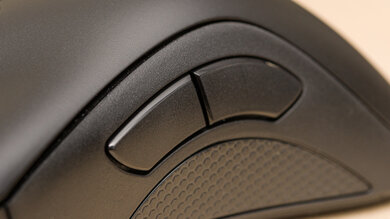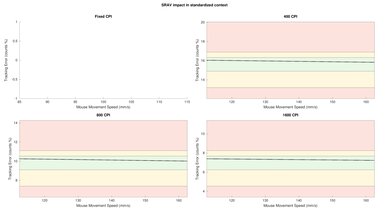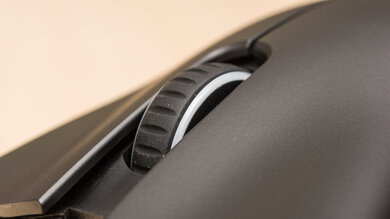The Razer DeathAdder Essential gaming mouse is a more affordable entry to the full-sized DeathAdder series. It has the same shape and size as the more expensive models, and it's suitable for all grip types for almost all hand sizes, although people with small hands might struggle with a claw or fingertip grip. It has a low minimum lift-off distance, decent click latency, and a fairly consistent sensor, but the CPI range isn't very wide, and you can adjust the CPI in increments of 100 only. Unfortunately, the mouse is quite heavy, its braided cable isn't very flexible, and its backlighting is green only.
Our Verdict
The Razer DeathAdder Essential is decent for office use. It feels well-built and is suitable for almost all hand sizes with any grip type, but small hands may struggle with a claw or fingertip grip. You can reprogram all of its buttons using the Razer Synapse 3 software, which is available on Windows only. Unfortunately, its scroll wheel doesn't have any L/R tilt buttons, and it can't unlock for free scrolling.
- Feels well-built.
- Suitable for almost all hand sizes with any grip type.
- No L/R tilt buttons or free scrolling.
- Wired-only.
The Razer DeathAdder Essential is good for FPS gaming. It has a low minimum CPI, a low lift-off distance, and satisfactory click latency, although it may not feel responsive enough for some gamers. It feels well-built and is suitable for almost all hand sizes using any grip type, but people with small hands may struggle with a claw or fingertip grip. Unfortunately, it's somewhat heavy, and its cable isn't very flexible.
- Feels well-built.
- Low minimum lift-off distance.
- Suitable for almost all hand sizes with any grip type.
- Somewhat heavy.
- Cable isn't very flexible.
The Razer DeathAdder Essential is a decent MMO gaming mouse, although it doesn't have nearly as many buttons as dedicated MMO mice. However, you can program all of them, and you can also set a HyperShift button to enable a second layer of commands. It has a low minimum lift-off distance and satisfactory click latency, although it may not feel responsive enough for some gamers. It feels well-built and comfortable, and it's suitable for almost all hand sizes using any grip type, although small hands may struggle with a claw or fingertip grip. Unfortunately, its cable isn't very flexible, and you can adjust the CPI in increments of 100 only.
- Feels well-built.
- Low minimum lift-off distance.
- Suitable for almost all hand sizes with any grip type.
- Cable isn't very flexible.
- Doesn't have nearly as many buttons as a dedicated MMO mouse.
Changelog
- Updated Dec 09, 2022: We've converted this review to Test Bench 1.4. This update modifies our Hand Size Recommendation test, adding a more granular hand size recommendation chart. We've moved several minor tests into different test groups, removed the Travel usage, and added a new Raw Performance usage. For more details, you can see our full changelog here.
- Updated Sep 08, 2022: We've converted this review to Test Bench 1.3. This update adds a new Sensor Latency test and makes minor changes to several of our existing tests, resulting in test result changes in several sections. For more information, you can check out our full changelog here.
- Updated Aug 09, 2022: Following the update to Test Bench 1.2, some of our test results have changed within both the Weight and CPI sections. We've added or modified some of the text in this article to clarify these changes.
- Updated Aug 01, 2022: We've converted this review to Test Bench 1.2. This update simplifies our Weight test and expands on our CPI test from Test Bench 1.1, resulting in changes to test results in both sections. For more details, you can see our complete changelog here.
Check Price
Differences Between Sizes And Variants
The Razer DeathAdder Essential gaming mouse is only available in black. You can see the label of our unit here.
Popular Mouse Comparisons
The Razer DeathAdder Essential is a more affordable addition to the DeathAdder series. It has the same right-handed and ergonomic shape as the other mice in this lineup, but it lacks some of the features the more expensive models that we've tested have. For example, its lift-off distance isn't as low, and you can't adjust its CPI as precisely as the Razer DeathAdder V2 or the Razer DeathAdder Elite. It also lacks CPI buttons below the scroll wheel, and unlike the other models with customizable RGB, the Essential only has green lighting. Nonetheless, it's a great option if you love the DeathAdder shape and don't mind a few shortcomings at the expense of a cheaper price tag.
Check out our recommendations for the best wired mouse, the best gaming mouse, and the best Razer mice.
The Logitech G305 LIGHTSPEED is a wireless-only mouse, while the Razer DeathAdder Essential is wired. The Logitech has an ambidextrous egg shape with two buttons on its left side and onboard memory. It has a very wide CPI range, a more precisely adjustable CPI, a lower lift-off distance, and lower click latency. It's suitable with a fingertip grip for any hand size, but people with larger hands may feel the mouse is too small for a palm or claw grip. On the other hand, the Razer is a right-handed mouse, and its larger size is better suited for larger hands.
The Logitech G502 HERO is overall better than the Razer DeathAdder Essential. It has much lower click latency, a wider CPI range, a more precisely adjustable CPI, a lower lift-off distance, and a more consistent sensor. The Logitech has more programmable buttons, and its scroll wheel has L/R tilt buttons and can unlock for free-scrolling. Also, unlike the Razer, the Logitech has onboard memory to save your settings. On the other hand, if you prefer lighter mice, the Razer may be a better choice.
The Razer DeathAdder V2 and the Razer DeathAdder Essential have the same shape and size, but the V2 performs better overall. It has a lower lift-off distance, a significantly lower click latency, a much wider CPI range, and you can adjust the CPI more precisely. Also, it has a much more flexible braided cable, better quality mouse feet, and two programmable buttons below the scroll wheel. The Essential is heavier, has no onboard memory, and only has green backlighting.
The Razer Basilisk and the Razer DeathAdder Essential are wired gaming mice with different designs, but the Basilisk performs better overall. It has a wider CPI range, a more precisely adjustable CPI, and a lower lift-off distance. It also has onboard memory and more programmable buttons. Also, the Basilisk is more versatile since it has a thumb rest, and its scroll wheel can unlock for free scrolling, which is great if you want to use it for office use.
Test Results


If you're interested in a similar wired gaming mouse with grippy rubber side panels, check out the Cooler Master MasterMouse MM530.
The polling rate options on the Razer DeathAdder Essential are 500Hz and 1000Hz.




